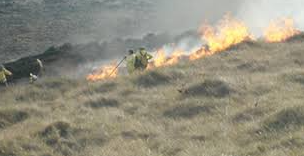Fire services issue urgent alerts as temperatures soar well above seasonal norms, with London set for 24°C on Friday
As the UK braces for its warmest day of the year so far, fire authorities are warning of a growing risk of wildfires fuelled by unseasonably high temperatures and persistently dry conditions. The Met Office has forecast temperatures reaching 24°C in London and the south-east on Friday, with Thursday potentially seeing highs of 23°C.
Dan Stroud, meteorologist at the Met Office, highlighted the unusual nature of this spike: “Typical temperatures for early April hover around 13°C, so we’re expecting around 10 degrees above average—an unusually warm start to the spring.”
High atmospheric pressure is currently maintaining stable, dry weather by preventing rain-bearing systems and cloud cover from moving in. This prolonged dryness follows an exceptionally dry March, which was the sixth driest on record for England and the fourth driest for Wales since 1836.
Firefighters across the UK remain on high alert. In Scotland, the fire and rescue service has issued “extreme” wildfire warnings, particularly for the south-west, central belt, eastern regions, and the north. Recent days have seen emergency crews tackling major blazes in locations including Galloway Forest Park.
The London Fire Brigade (LFB) is also sounding the alarm. Assistant Commissioner Thomas Goodall said that wildfire risks in the capital are elevated due to minimal rainfall. The brigade recorded a 48% surge in emergency call-outs last weekend compared to the same period last year. He urged the public to avoid lighting barbecues and to be mindful of fire safety in green spaces.
“Some of the fires we’ve responded to are thought to have been started deliberately,” Goodall said. “While it might seem like harmless behaviour, the consequences under current weather conditions can be serious.”
He appealed to families to ensure children are aware of the dangers and called on Londoners to remain vigilant during the Easter break, when more people are expected to enjoy outdoor spaces.
So far in 2025, the UK has already seen at least 286 wildfires—over 100 more than at this point in 2022, when the country experienced record-breaking heat and unprecedented fire activity.
The National Fire Chiefs Council has called for long-term investment in fire services to meet the growing challenges posed by climate change and the increasing demand on emergency resources.
With forecasts pointing to continued dry and warm conditions into the weekend, authorities across Britain are urging the public to enjoy the sunshine sensibly and help minimise the risk of fires.



Leave a Reply